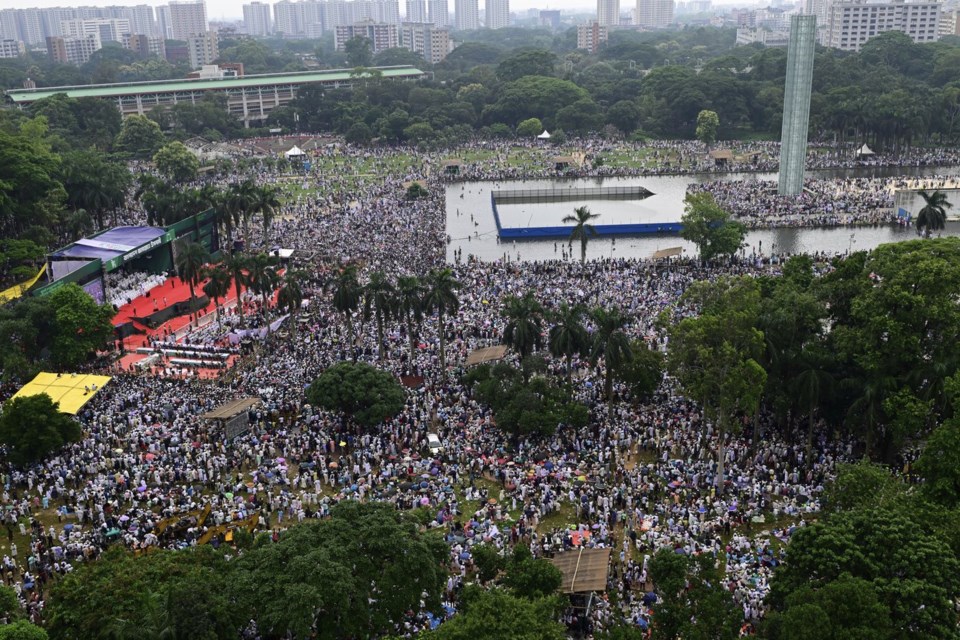DHAKA, Bangladesh (AP) — Hundreds of thousands of supporters of Bangladesh’s largest Islamist party rallied in the capital on Saturday to show their strength ahead of elections expected next year, as the South Asian nation stands a t a crossroads after the ouster of former Prime Minister Sheikh Hasina.
An interim government headed by Nobel Peace Prize laureate Muhammad Yunus said the next election would be held in April but his administration did not rule out a possibility of polls in February as strongly demanded by the Bangladesh Nationalist Party and its allies.
Jamaat-e-Islami, which had sided with Pakistan during Bangladesh's war of independence in 1971, said earlier it would mobilize 1 million people on Saturday.
While Hasina was in power from 2009 until she was toppled in student-led protests last year and fled to India, top leaders of Jamaat-e-Islami were either executed or jailed on charges of crimes against humanity and other serious crimes in 1971. In late march in 1971 Pakistan’s military had launched a violent crackdown on the city of Dhaka, then part of East Pakistan, to quell a rising nationalist movement seeking independence for what is today known as Bangladesh.
Islamists demand free and fair elections
The party on Saturday placed a seven-point demand to the Yunus-led administration to ensure a free, fair and peaceful election, the trial of all mass killings, essential reforms and proclamation and implementation of a charter involving last year’s mass uprising. It also wants the introduction of a proportional representation system in the election.
Thousands of supporters of Jamaat-e-Islami had spent the night on the Dhaka University campus before the rally. On Saturday morning, they continued to stream toward the Suhrawardy Udyan, a historical ground where the Pakistani army had surrendered to a joint force of India and Bangladesh on Dec. 16 in 1971, ending the nine-month war.
“We are here for a new Bangladesh where Islam would be the guiding principle of governance, where good and honest people will rule the country, and there will be no corruption,” Iqbal Hossain, 40, told The Associated Press. “We will sacrifice our lives, if necessary, for this cause.”
Many of the young supporters in their 20s and 30s were also present.
“Under Jamaat-e-Islami, this country will have no discrimination. All people will have their rights. Because we follow the path of the holy book, Quran,” Mohidul Morsalin Sayem, a 20-year-old student, said. “If all the Islamist parties join hands soon, nobody will be able to take power from us.”
It was the first time the party was allowed to hold a rally on this ground since 1971. To many, the decision signaled a shift supported by Yunus' government in which Islamists are gaining momentum with further fragmentation of Bangladesh’s politics and shrinking of liberal forces.
Tensions between parties over Yunus' reforms
Hasina, whose father was the independence leader and the country’s first president, is a fierce political rival of Jamaat-e-Islami. The party is expected to contest 300 parliamentary seats and is attempting to forge alliances with other Islamist groups and parties in hopes of becoming a third force in the country behind the BNP, headed by former Prime Minister Khaleda Zia, and Hasina’s former ruling Awami League party.
The party had previously shared power with the BNP, and it had two senior Cabinet members under Zia in 2001-2006. After Hasina was ousted, tensions grew between parties over reforms agenda undertaken by the Yunus government, which is facing challenges to establish order in the country.
The government has been criticized by Hasina's party and others for using force in a confrontation with protesters in a Hasina stronghold on Wednesday, where four people died. Their families complained that authorities did not conduct autopsies and hurriedly buried or cremated their relatives. Autopsies are part of an investigation in any violence. Yunus’ office said the government was doing everything lawfully in Gopalganj, the district where the violence occurred.
Jamaat-e-Islami has now established close ties with a new political party formed by students who led the anti-Hasina uprising. Both Jamaat-e-Islami and the students' National Citizen Party also promote anti-India campaign.
The Yunus-led administration has banned the Awami League and Hasina has been in exile in India since Aug. 5. She is facing charges of crimes against humanity. The United Nations said in February that up to 1,400 people may have been killed during the anti-Hasina uprising in July-August last year.
Julhas Alam, The Associated Press




